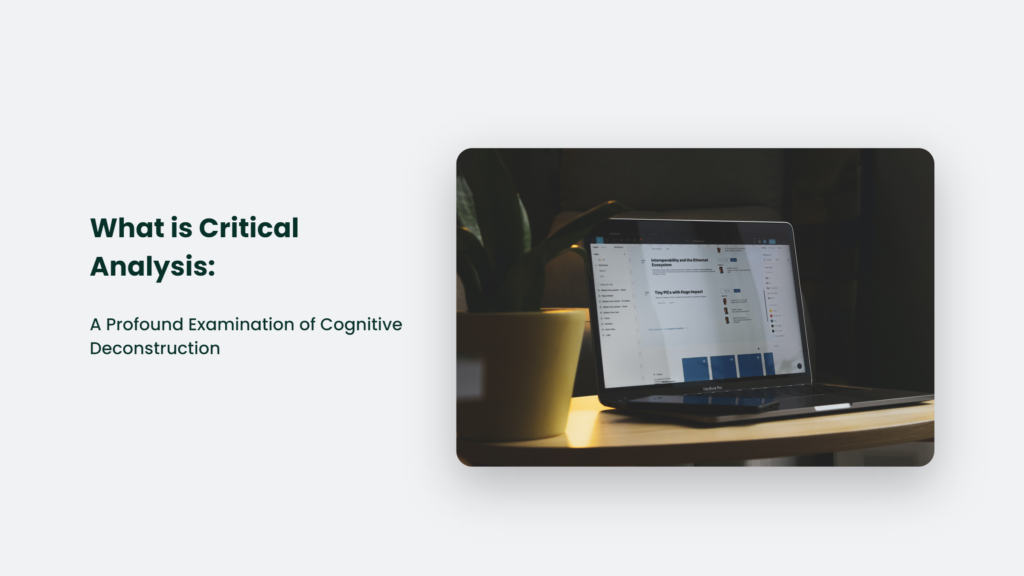

What is Critical Analysis: A Profound Examination of Cognitive Deconstruction

As Seen On
Critical analysis is a pillar of profound significance in the vast realm of intellectual exploration. Often praised as a cognitive deconstruction tool, critical analysis allows individuals to delve into the depths of ideas, arguments, and information with a discerning eye.
In this comprehensive article, we embark on an enlightening journey to unravel the essence of critical analysis, its key components, and its application in various domains. So, fasten your seatbelts and prepare to sharpen your analytical prowess!

What is Critical Analysis: Peering Beneath the Surface
Before we embark on our quest to grasp the true nature of critical analysis, let’s begin by demystifying its fundamental definition. Critical analysis, in essence, refers to carefully evaluating and deconstructing ideas, concepts, arguments, or texts to discern their validity, coherence, and underlying assumptions. It involves meticulously examining evidence, logic, and reasoning to arrive at well-informed conclusions.
A Tool for Intellectual Empowerment
Critical analysis is a powerful tool that empowers individuals to engage with ideas thoughtfully and discerningly. By honing this skill, one can bypass the allure of surface-level information and venture into the depths of complex issues, unearthing hidden nuances and uncovering multiple perspectives.
Cultivating Intellectual Autonomy
Critical analysis nurtures intellectual autonomy, allowing individuals to think independently and challenge prevailing beliefs or dogmas. As philosopher, Michel Foucault once remarked, “Do not ask who I am and do not ask me to remain the same.” Critical analysis encourages a mindset that questions the status quo, dismantles biases, and fosters personal growth.
The Anatomy of Critical Analysis: Unveiling the Building Blocks
To master the art of critical analysis, one must comprehend its essential components. Let’s delve into the key elements that constitute this cognitive framework.
Evaluation of Evidence
At the core of critical analysis lies the evaluation of evidence. This process involves scrutinizing information quality, relevance, and credibility to ascertain its reliability. One can discern between reliable sources and misleading claims by embracing healthy scepticism and applying rigorous standards.
Identification of Assumptions
Critical analysis requires a keen eye for identifying assumptions—underlying beliefs or propositions that serve as foundations for arguments. By unmasking these assumptions, individuals gain insights into the implicit biases, value systems, or ideologies that shape the perspectives presented.
Logical Reasoning
Logical reasoning serves as a fundamental tool in the arsenal of critical analysis. It enables individuals to assess the coherence and validity of arguments, identifying any fallacies, inconsistencies, or gaps in reasoning. Critical thinkers can construct robust arguments or dismantle flawed ones by employing deductive and inductive reasoning.
Unleashing the Power of Critical Analysis: Practical Applications
Now that we have grasped critical analysis’s core tenets let’s explore its practical applications across various domains.
Academic Excellence
In academia, critical analysis forms the bedrock of rigorous scholarship. It empowers students and scholars to dissect scholarly articles, research papers, and literary works, enabling them to engage with the ideas presented and contribute to the existing body of knowledge.
Decision Making and Problem-Solving
Critical analysis equips individuals with the ability to make informed decisions and solve complex problems. By critically evaluating different options, weighing their merits, and considering potential consequences, one can navigate the maze of choices more effectively.
Media Literacy
In an era inundated with information, media literacy is of utmost importance. Critical analysis enables individuals to distinguish between reliable journalism and sensationalized narratives, allowing them to make informed decisions and form well-rounded opinions. By critically analyzing media sources, individuals can uncover biases, question underlying motives, and separate facts from misinformation or propaganda.
Professional Growth
In the professional realm, critical analysis enhances one’s ability to assess organizational strategies, evaluate market trends, and identify opportunities or risks. By applying critical thinking skills, professionals can make sound judgments, devise effective solutions, and contribute meaningfully to their respective fields.
Personal Development
The critical analysis also extends its benefits to personal development. By subjecting our beliefs, values, and assumptions to scrutiny, we can cultivate self-awareness, challenge limiting beliefs, and embrace intellectual growth. Critical analysis encourages us to examine our perspectives, confront cognitive biases, and adopt a more holistic and nuanced worldview.
The Art of Questioning: Provoking Insights through Inquiry
Within critical analysis, questions serve as catalysts for intellectual exploration. Let’s delve into the art of questioning and how it fuels our analytical endeavours.
The Power of Hypothetical Questions
Hypothetical questions like “What if?” or “Why not?” invite us to explore alternative scenarios and challenge conventional wisdom. Critical thinkers can transcend existing boundaries and envision new possibilities by posing these thought-provoking queries.
Rhetorical Questions: A Call to Reflection
Rhetorical questions engage our reflective faculties, encouraging us to ponder deeper meanings and implications. They prompt introspection and stimulate critical analysis by inviting us to examine our assumptions, biases, and preconceived notions.
The Role of Metaphors: Unveiling Complexities through Figurative Language
Metaphors, as linguistic devices, enable us to convey complex ideas or concepts in a more accessible and engaging manner. Metaphors can illuminate intricate notions within the critical analysis and inspire deeper understanding.
For instance, imagine critical analysis as a mental “X-ray machine,” allowing us to peer through the surface and expose the hidden structures beneath. This metaphor highlights the capacity of critical analysis to reveal the underlying frameworks, assumptions, and logical connections that shape arguments and ideas.
Frequently Asked Questions:
Are there any risks associated with critical analysis?
While critical analysis is a powerful tool, it’s important to approach it cautiously. Overreliance on scepticism can lead to perpetual doubt, hindering the ability to form constructive opinions or take decisive action. Striking a balance between critical thinking and open-mindedness is essential for reaping the full benefits of critical analysis while maintaining a healthy intellectual curiosity.
Can critical analysis be applied to creative fields?
Absolutely! Critical analysis is not limited to academic or analytical disciplines. It can be applied to creative fields such as literature, art, music, and film. By critically analyzing creative works, one can delve into the deeper meanings, symbolism, and social commentary embedded within them.
Conclusion: Unleashing the Power of Critical Analysis
In conclusion, critical analysis emerges as a potent tool that unlocks the doors of intellectual exploration empowers decision-making, and nurtures personal growth. By embracing this cognitive framework, we can peel back the layers of information, question prevailing beliefs, and uncover new insights.
Remember, critical analysis is not a rigid formula but a mindset—a way of engaging with the world that embraces intellectual curiosity, logical reasoning, and the courage to challenge the status quo. So, let us embark on this transformative journey of cognitive deconstruction and unlock the immense power of critical analysis!
Konger
Up until working with Casey, we had only had poor to mediocre experiences outsourcing work to agencies. Casey & the team at CJ&CO are the exception to the rule.
Communication was beyond great, his understanding of our vision was phenomenal, and instead of needing babysitting like the other agencies we worked with, he was not only completely dependable but also gave us sound suggestions on how to get better results, at the risk of us not needing him for the initial job we requested (absolute gem).
This has truly been the first time we worked with someone outside of our business that quickly grasped our vision, and that I could completely forget about and would still deliver above expectations.
I honestly can't wait to work in many more projects together!
Disclaimer
*The information this blog provides is for general informational purposes only and is not intended as financial or professional advice. The information may not reflect current developments and may be changed or updated without notice. Any opinions expressed on this blog are the author’s own and do not necessarily reflect the views of the author’s employer or any other organization. You should not act or rely on any information contained in this blog without first seeking the advice of a professional. No representation or warranty, express or implied, is made as to the accuracy or completeness of the information contained in this blog. The author and affiliated parties assume no liability for any errors or omissions.

